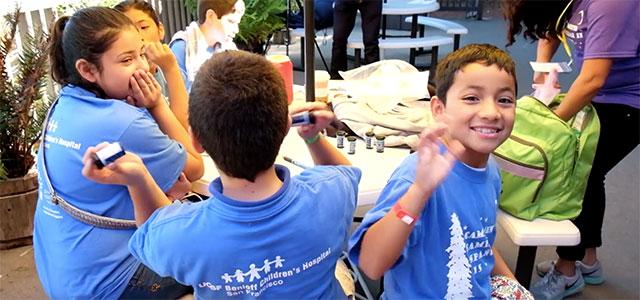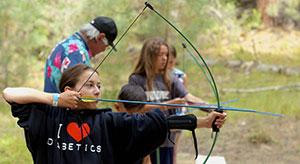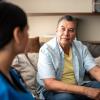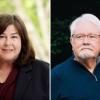
Diabetes Camp a Life-Changing Experience for Families and Clinicians
In 1938, UC San Francisco physician Mary B. Olney did something almost unthinkable. She and a colleague packed 19 children with type 1 diabetes – who were normally treated like invalids – into several flatbed trucks and took them to the Sierra Nevada mountains, where they hiked, swam, played and spent their summer days doing what their peers without diabetes did. That extraordinary trip became an annual event and evolved into a series of programs, now run by the nonprofit organization DYF (Diabetes Youth Families), in which families dealing with diabetes come together with peer counselors and health care and other professionals to play, learn and exchange ideas about living well with diabetes.
Including Families in the Experience
While there have been dramatic advances in treatment and quality of life for people with diabetes over the decades since those first campers headed for the mountains, it remains a life-altering diagnosis. It requires constant monitoring, adjustment and planning, which can be overwhelming for families. “It doesn’t just affect the individual; it affects the siblings, the parents, grandparents and caregivers,” says Kaylor Glassman, DYF’s resident camp director. That’s why, early on, Ellen Simpson, Olney’s longtime medical partner, who had become director of DYF, suggested including families in the camp experience, something that has become central to DYF’s mission.
In addition to longer camps for kids and teens with diabetes, DYF offers several weekendlong family camps, which include siblings and parents or caregivers. While the kids are with counselors swimming, doing archery, making art and taking nature hikes, parents attend education and support sessions with professionals, including diabetes educators, dieticians and health care providers. Part of the purpose is to let families know they’re not alone and to help them develop a community of support.
Nurse practitioner Alex Freeman (MS ’15), who started attending camp when she was diagnosed with type 1 diabetes at age 4, says, “It was a really special place for my family because it was such a community. I know that my parents in particular really valued the people they met there and the year-round support that connected the families even when they weren’t at camp.”
Freeman is one of a group of UC San Francisco School of Nursing nurse practitioner students that pediatric nurse practitioner Maureen McGrath has been bringing to volunteer at the camps since 2013. McGrath, who has been living with diabetes for 40 years, serves as program director for the School’s Peggy Huang Diabetes Nurse Fellows Program, run in partnership with the Madison Clinic for Pediatric Diabetes at UCSF. DYF relies on volunteers like McGrath and her students to provide health care services and education and, in return, helps these future practitioners develop expertise by engaging in intensive, real-world experience.
From Doubter to Diabetes Specialist
The partnership between the School and DYF emerged from McGrath’s long history with DYF camps. She first heard of them when she was around 14 and struggling with her own diabetes. She wasn’t impressed.
“I have a very visceral memory of looking at the brochure and thinking, ‘These people look normal, but I don’t want to go to a diabetes camp.’ I didn’t want that identity,” she says.
McGrath’s reaction was not unusual among adolescents with diabetes, who often just want to be like their peers, without the added burden of having a chronic condition. McGrath says, “I mistakenly thought it would be about hanging out with people who had poor identity around their diabetes and felt ill and victimized, instead of what actually happens, which is that they come together and have a healing and bonding process.”
 While campers have fun with the counselors and activities, parents attend education and support sessions. McGrath didn’t get to experience this for herself until she was in college and her sister urged her to go to camp as a counselor. She went, but because she was having trouble managing her own diabetes, it was with a great deal of trepidation. “I was very nervous going to camp,” she says. “I felt isolated and ashamed and thought I was the only one who wasn’t getting it right. I felt like an imposter.” Within days of arriving at camp, McGrath realized that everyone around her was struggling, too.
While campers have fun with the counselors and activities, parents attend education and support sessions. McGrath didn’t get to experience this for herself until she was in college and her sister urged her to go to camp as a counselor. She went, but because she was having trouble managing her own diabetes, it was with a great deal of trepidation. “I was very nervous going to camp,” she says. “I felt isolated and ashamed and thought I was the only one who wasn’t getting it right. I felt like an imposter.” Within days of arriving at camp, McGrath realized that everyone around her was struggling, too.
At the time, there was very little specialty care for people with diabetes and certainly nothing comprehensive or holistic. McGrath, like many of her peers, had her first home glucose monitor, but she had no idea what to do with the information it gave her. Her doctor instructed her to use the monitor but didn’t teach her how to adjust her insulin or change her diet in response to what it told her.
And no one was addressing the emotional aspects of living with a difficult chronic disease. The doctors and nurses at camp filled that gap. They took care of the counselors as well as the campers, and taught McGrath how to use the information she got from her monitor. “They immediately advanced my therapy,” she says.
Moreover, being around other campers, counselors and health care providers who understood her struggles helped pull her out of the depression that she had been experiencing. “I was sure I was going to die young,” she says. “It took me years to shed this fatalism around my diabetes. I attribute that 100 percent to camp.”
McGrath’s experience helped form her desire to become a health care provider who could bring some of the holistic care she’d experienced at camp into the clinical setting. After working with several advanced practice nurses at camp (she became the director of DYF’s Bearskin Meadow Camp in 1991), she completed the newly created Master’s Entry Program in Nursing at UCSF, getting her RN degree and becoming a pediatric nurse practitioner. She worked in the UCSF Diabetes Clinic, then at the Emory Children’s Center Division of Diabetes and Endocrinology in Atlanta, before returning to UCSF to help develop and direct the School’s diabetes minor.
An Immersive Experience for Future Clinicians
Directing and teaching in the minor afforded her the perfect opportunity to connect advanced practice nursing students who were interested in working in diabetes management with the camp experience. In 2013 McGrath began taking a group of six to eight students to Bearskin Meadow to work at the camp each summer and for weekends in October and February. McGrath provides a didactic each morning, and students are given the responsibility of managing the care of small groups of campers.
 Alex Freeman (left) and Maureen McGrath The benefits are myriad. Freeman, who started in the diabetes minor in 2013, says, “I really got a feel for what it would be like to be the provider responsible for caring for people with diabetes.” She managed a group of about 17 campers, checking in with them at meals, adjusting their insulin and helping them manage their diabetes as they participated in sports and other activities. It helped her become more comfortable in her role as an independent clinician. “Being totally integrated into that role and making some of those diabetes decisions was a really wonderful experience,” she says.
Alex Freeman (left) and Maureen McGrath The benefits are myriad. Freeman, who started in the diabetes minor in 2013, says, “I really got a feel for what it would be like to be the provider responsible for caring for people with diabetes.” She managed a group of about 17 campers, checking in with them at meals, adjusting their insulin and helping them manage their diabetes as they participated in sports and other activities. It helped her become more comfortable in her role as an independent clinician. “Being totally integrated into that role and making some of those diabetes decisions was a really wonderful experience,” she says.
The immersive experience also helps future clinicians develop a deeper understanding of the challenges families face. Because most clinicians see patients only in the artificial environment of the clinic or hospital, they may not entirely grasp what managing the condition means on a day-to-day basis, even when someone is healthy. McGrath says, “There’s no better way to normalize the experience of diabetes than putting a clinician into an environment where they truly understand the complexity that’s involved.”
At camp, students also get a very real sense of the importance of taking care of the emotional needs of both patients and families. Among the first activities at family camp is telling diagnosis stories. McGrath notes that it’s an essential part of the process because the emotional impact too often gets swept over in the initial whirlwind of testing, data collection and instruction that accompanies a diabetes diagnosis, which frequently happens when a child is already critically ill.
She says, “We set the emotional tone at family camp by saying we want to hear your stories.” It’s something she tries to impart to her students in the classroom, she notes, but there’s no substitute for experiencing it in real life.
Expanding the Experience to Spanish-Speaking Families
UCSF Campamento HighRes from UCSF on Vimeo. In 2015, the partnership between DYF and the School bore additional fruit. A group of generous donors to the Madison Clinic, who wanted to ensure that other families had access to the kind of care their children had, funded Campamento, a weekend camp for Spanish-speaking families dealing with diabetes. DYF managed the enrollment and the program administration, and UCSF provided the clinical services and education, recruiting native Spanish-speaking volunteers from around the Bay Area. The first weekend, held in October 2015, served more than 20 families and was so successful that DYF has had to reserve a larger space for this year’s camp, which has a long waiting list.
The goal is, of course, to make the camp experience available to anyone who could benefit from it, regardless of ability to pay. While there are program fees, says Glassman, DYF provides a large number of scholarships, and the majority of families’ fees are subsidized by donors. The commitment of volunteers – nurses, doctors, pharmacists, dieticians, counselors and laypeople – makes it all possible, and Glassman is particularly grateful for the partnerships DYF has forged with groups like UCSF, Cal Poly’s Food Science and Nutrition program, Kaiser Permanente Roseville Medical Center and Samuel Merritt University.
“Coming to camp is a life-changing experience,” says Glassman, a sentiment with which McGrath and Freeman concur.
“Camp always felt magical to me as a kid,” says Freeman. “As a nurse, being part of making it happen was a great feeling.”



